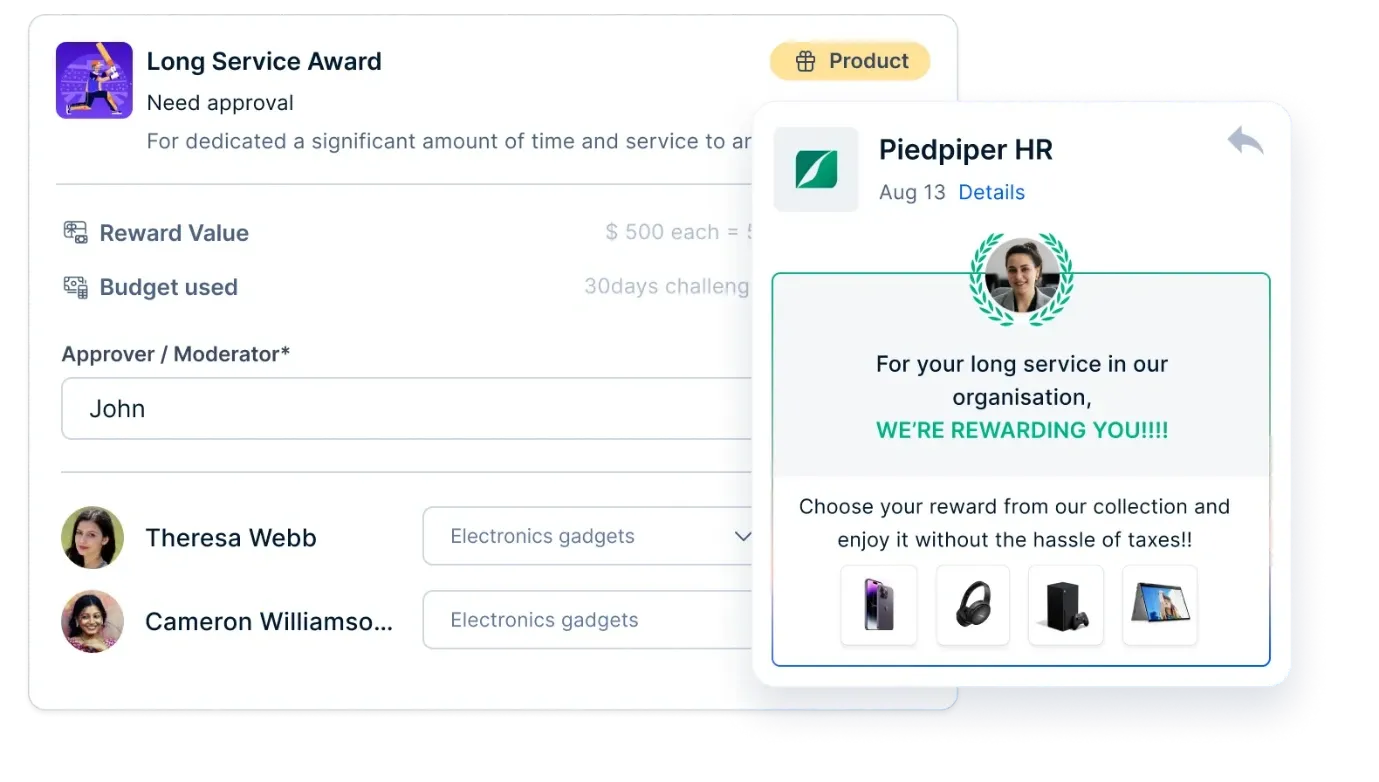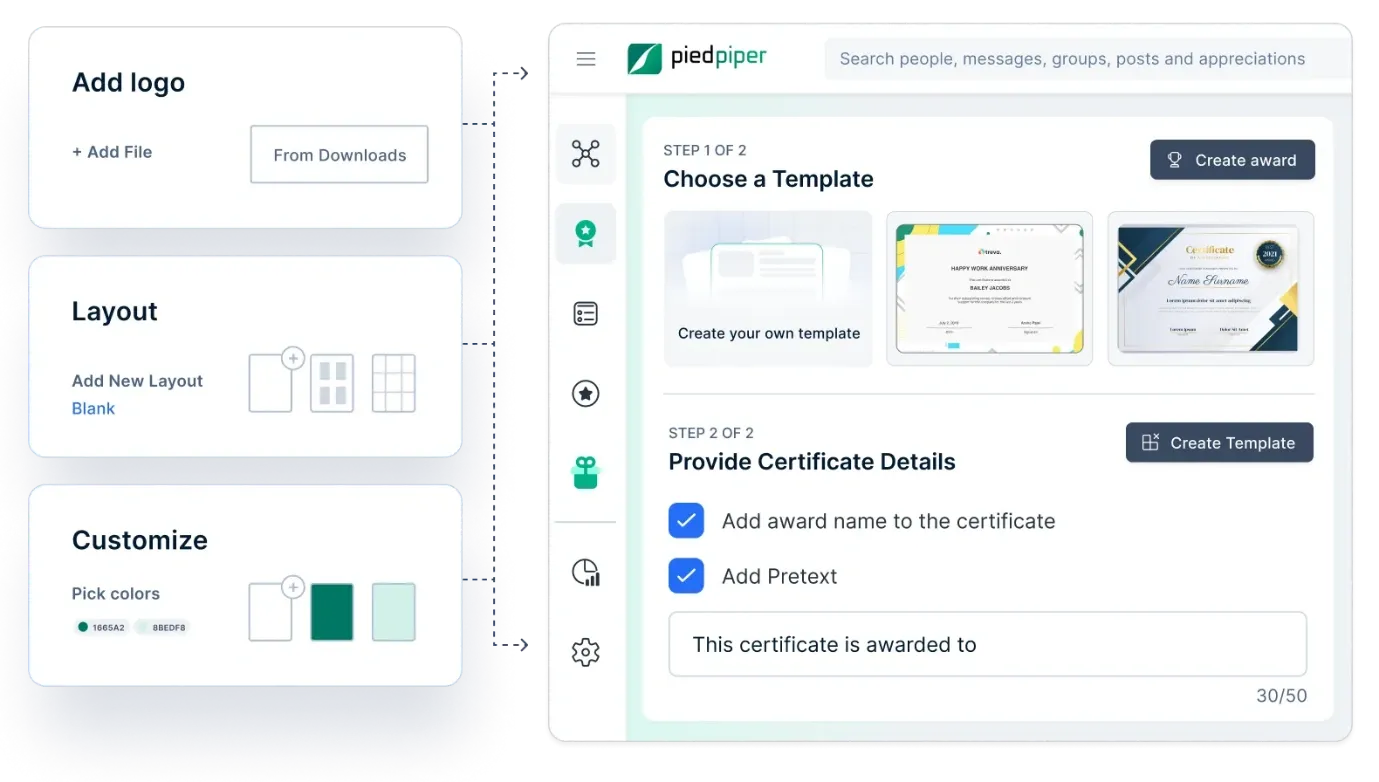5 Proven Ways to Empower Human Resources for Success
Learn 5 keyways to empower human resources and foster a thriving, engaged workforce. Improve transparency, recognition, and development to drive success.
On this page
- Top 5 ways to empower HR through data literacy
- How to empower human resources for an engaged workforce?
- Empowering HR with AI
- Take employee rewards and recognition to the next level with Empuls
- Best practices for HRs to develop a culture of recognition and engagement
- Start building a better company culture today
- FAQs
Empowering human resources (HR) to create autonomous and efficient teams is crucial for any organization. Not only does it enhance overall business operations, but it also fosters a more engaged, productive, and satisfied workforce.
HR professionals are well-positioned to implement initiatives that empower employees, but additional tools and resources may be necessary to refine these processes and establish best practices. By leveraging strategic HR techniques, businesses can empower human resource departments to cultivate a workplace culture that supports growth, autonomy, and efficiency.
Below, explore key HR strategies to effectively empower resources and maximize employee potential.
Top 5 ways to empower HR through data literacy
Empowering HR with data literacy transforms decision-making, enhances employee experience, and aligns workforce strategies with business goals. Here are five keyways to make HR more data-savvy.
1. Leverage HR analytics tools for smarter decision-making
HR teams should adopt data-driven tools that automate workforce analytics, track key metrics, and offer insights into employee engagement, retention, and productivity. Platforms like Empuls surveys provide real-time feedback and sentiment analysis, helping HR measure workplace morale and make informed decisions.
2. Foster a culture of data-driven communication
HR professionals need to shift from gut-based decisions to data-backed storytelling. By using Empuls social intranet, HR can create a central hub where workforce insights, employee trends, and business updates are shared transparently. This improves alignment across teams and encourages data-based discussions.
3. Provide training on data interpretation and compliance
HR teams must be equipped with the skills to interpret workforce data, identify trends, and ensure compliance with data privacy regulations. Organizations can offer HR analytics training and workshops to help HR professionals confidently analyze and act on key insights.
4. Use employee surveys to gather actionable insights
Empuls surveys allow HR to collect structured feedback, identify employee concerns, and measure engagement over time. Regular pulse surveys provide clear, measurable insights that help HR fine-tune policies, improve company culture, and boost retention.
5. Enable self-service data access with interactive dashboards
HR teams should have access to self-service analytics tools that allow them to track hiring trends, diversity metrics, and employee performance without relying on IT. By integrating HR dashboards with Empuls social intranet, organizations create a data-driven HR function that is proactive, strategic, and well-informed.
Empuls provides HR teams with powerful survey and intranet tools that streamline data collection, enhance communication, and foster a more connected and engaged workforce.
How to empower human resources for an engaged workforce?
Creating a culture of empowerment within the human resource department and across an organization requires strategic HR practices. By implementing effective methods, companies can empower resources, ensuring employees feel valued, capable, and motivated. Here are five proven ways to achieve this:
1. Hire employees who align with your vision
A strong workforce starts with hiring the right people. During recruitment, seek candidates whose values align with the company’s mission and long-term objectives.
Employees who are naturally engaged and committed will respond more positively to the initiatives and resources HR provides. By selecting the right talent, HR can empower human resources to build a more cohesive and driven team.
2. Foster transparency and trust
To empower employees, transparency between management and staff is essential. HR can facilitate this by implementing tools like organizational flow charts, internal communications platforms, and company-wide infographics.
These resources enable employees to stay informed and engaged, fostering an environment of trust and collaboration. Open communication channels help employees feel confident in their roles and contribute to a more empowered workforce.
3. Provide ongoing professional development
One of the most effective ways to empower resources within a company is to offer access to career development opportunities. HR departments can serve as a hub for training and skill-building programs that help employees grow professionally.
Whether through mentorship, certifications, or internal training, these initiatives give employees the confidence to perform effectively in their roles and prepare for future career advancement.
4. Cultivate a culture of constructive feedback
Encouraging continuous feedback strengthens employees’ confidence and autonomy. HR can implement structured performance review processes that include both managerial assessments and follow-ups with HR professionals.
By fostering an open feedback culture, employees will feel heard and motivated to improve, ultimately strengthening their sense of empowerment and belonging within the organization.
5. Recognize and reward employee achievements
Acknowledging hard work and dedication is crucial for maintaining an empowered workforce. HR professionals can implement meaningful rewards programs that resonate with employees.
This could include monetary incentives, additional paid time off, or thoughtful perks tailored to the workforce—such as digital gift cards for remote teams or free office amenities for in-person staff. By offering rewards that align with employees’ needs, HR can reinforce motivation and engagement.
Empowering HR with AI
Artificial Intelligence (AI) is revolutionizing the HR landscape, enhancing efficiency, personalization, and strategic decision-making. Here’s how AI can empower HR professionals:
1. Automated recruitment and talent acquisition
AI-powered tools can streamline recruitment by screening resumes, predicting candidate suitability, and reducing hiring bias. AI chatbots can also enhance candidate experience by answering queries and scheduling interviews.
2. Enhanced employee engagement and personalization
AI-driven sentiment analysis helps HR measure workplace morale by analyzing employee feedback, emails, and surveys. AI can personalize engagement strategies, ensuring HR initiatives align with employee preferences.
3. Intelligent HR analytics and insights
AI-powered analytics provide HR teams with real-time workforce insights, allowing them to track performance trends, forecast turnover risks, and optimize workforce planning.
4. Automated HR processes and chatbots
AI-driven HR chatbots can handle repetitive inquiries about policies, leave management, and payroll, freeing up HR professionals to focus on strategic initiatives.
5. AI-powered learning and development
AI helps in upskilling employees by recommending personalized learning paths, tracking skill development, and suggesting career growth opportunities based on individual performance data.
By integrating AI into HR functions, companies can foster a more efficient, data-driven, and engaged workforce while enabling HR teams to focus on higher-value strategic initiatives.
Take employee rewards and recognition to the next level with Empuls
To further strengthen employee recognition and motivation, organizations can leverage Empuls, a comprehensive employee rewards and recognition platform. Empuls helps HR teams seamlessly implement and manage rewards through:
Multiple award types:

- Value badges, spot awards, and peer awards for real-time recognition
- Approval-based awards with nomination workflows and jury panels
- Performance and incentive-based awards linked to various goals
Rewards & budgets:

- Automated reward budget distribution through workflow-based approvals
- Instant redemption and delivery via a built-in rewards store
- Full visibility into reward points and budget utilization for better tracking
Branding & customization:

- Personalize the platform with your company’s branding
- Choose from ready-to-use award templates or upload custom designs
- Add customized certificates to enhance the recognition experience
By integrating Empuls into your HR strategy, you can streamline rewards, reinforce employee motivation, and create a culture of continuous recognition. Empower human resources with the right tools to build an engaged, high-performing workforce. Schedule a call now!
Best practices for HRs to develop a culture of recognition and engagement
It’s much easier to feel empowered and stand behind your HR decisions when you have a clear plan in place. These tips will help you develop a culture of recognition and engagement among your employees:
1. Offer more flexibility
These days, employees are demanding flexibility more than ever before. They want opportunities to work remotely and choose their own schedule.
When possible, do your best to accommodate these requests and provide employees with a more flexible work environment.
Increased flexibility allows employees to work when and where they are most productive. As a result, their performance and ability to get things done increases.
You can also use flexibility as a reward. For example, if certain employees consistently go above and beyond, you may offer them the chance to work from home a couple of days per week.
2. Encourage employee involvement
If you’re worried about a lack of employee engagement, one of the most effective ways to mitigate that issue is to encourage employee involvement. In other words, find ways for employees to play a more prominent role in the company.
Maybe you work with managers and team leaders to develop special projects that cater to employees’ unique skills and interests. Perhaps you invite certain team members to participate in leadership meetings or brainstorming sessions.
Consider using multiple methods of involving employees, too.
For example, some might feel uncomfortable speaking up in a meeting. However, they may feel comfortable sharing feedback in a one-on-one session or submitting feedback through an anonymous virtual form.
3. Act on employee feedback
Remember that it takes a lot of guts for employees to speak up and share their opinions or offer suggestions. Employees might feel nervous about providing feedback, perhaps because they think they might be penalized or think nothing will change just because they shared their insights.
To combat this narrative and empower employees to speak up in the future, act on their feedback whenever possible.
You won’t always be able to implement every suggestion, of course. However, you can make some changes that show your employees you value their input and want them to continue offering ideas in the future.
4. Provide opportunities for growth and development
If your employees feel bored at work or stuck in one position without room for growth, their engagement will naturally drop. To combat this issue, provide them with regular opportunities for growth and development.
For example, if you know that some employees are interested in moving up to a different department, consider offering classes that teach the skills they need to make that transition.
You can also offer leadership training courses to help employees interested in becoming team leaders or managers develop essential hard and soft skills.
5. Recognize and celebrate employee achievements
A little recognition can go a long way when it comes to increasing employee engagement and motivating them to go the extra mile in the future.
When an employee does something good, from completing a big project to making meaningful progress toward a larger goal, celebrate them. For example, send them a message telling them you see and appreciate their hard work. You could also offer them a prize like a cash bonus or a gift card to a local restaurant.
Consider asking employees to share a list of rewards that they would appreciate the most. That way, you can trust that you’re offering incentives that are actually meaningful to them (and are more likely to boost motivation in the future).
6. Prioritize employee safety and security
Employees are more likely to be engaged if they feel safe. If they know that their employer is committed to protecting them from the hazards associated with their role, they’ll feel more confident and have an easier time being productive.
As an HR manager, developing and implementing safety and security procedures that benefit your employees is critical to your job. From badge systems and panic buttons to video surveillance, look for ways to give team members peace of mind and reduce their risk of accidents, injuries, etc.
Start building a better company culture today
Increasing employee engagement and recognition can significantly improve your organization’s culture and make your job as an HR manager much more manageable. Use the information and tips discussed above to create an effective plan that enhances company culture and produces significant results.
FAQs
1. What is empowered human resources?
Empowered human resources refer to an HR department that actively supports, motivates, and equips employees with the tools, resources, and opportunities needed to succeed. This includes fostering transparency, professional development, recognition, and a culture of trust and feedback.
2. What are the 7 human resources?
The seven key functions of human resources are:
- Recruitment and staffing
- Employee relations
- Training and development
- Compensation and benefits
- Performance management
- Compliance and legal responsibilities
- Workplace safety and health
3. What is empower employees?
Empowering employees means giving them the confidence, autonomy, and resources to take ownership of their roles. It involves providing them with training, feedback, recognition, and the tools needed to make informed decisions, ultimately driving engagement and productivity.


















